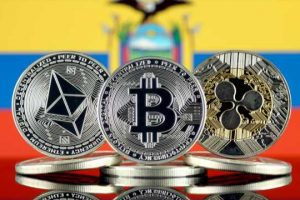Ecuadorian Presidential Candidate Proposes a National Cryptocurrency but It Won't Replace the Dollar – Economics Bitcoin News

An Ecuadorian presidential candidate hinted at creating a cryptocurrency in the country as part of its government agenda. Giovanny Andrade said that the national crypto aims to “facilitate” transactions across the country.
Crypto Could Be Backed by Gold
During an interview with Primicias, Andrade, representing the Union Ecuatoriana party, believes its cryptocurrency idea is a crucial part of his country’s proposals. However, he doesn’t want to ride off from Ecuador’s dollarized economy:
We are looking at ways to create an Ecuadorian cryptocurrency. This does not mean that we are going to escape from dollarization. We must support dollarization.
The Ecuadorian-Chilean Mining Chamber also claimed that a series of investors want to allocate $320 million to finance a “Latin American gold refinery.” He also said that such cryptocurrency is backed by the yellow metal gold, like Venezuela’s petro with oil.
Andrade continued to talk about the national crypto plans on his agenda in case he gets elected on February 7, 2021:
“It is essential that we create the cryptocurrency for all the internal benefits within the country, such as internal transactions. This would work very well for Ecuador.
Could the Hypothetical Ecuadorian Cryptocurrency Be Another Venezuelan Petro?
Dollarization in Ecuador has been a sensitive topic in the public discussion. In 1999, the country adopted the dollar as its official currency. All of this happened within the context of a strong economic and inflationary crisis.
Jamil Mahuad, the then-president of Ecuador, was dismissed from his duties in January 2000, since political parties blamed him for unleashing the economic crisis. However, no president has been able to remove dollarization’s policy.
In terms of the crypto industry, the Latin American country is not a well-known player within the regional sphere. However, Ecuador has been showing some interest in blockchain adoption in the country’s banking and dairy sectors.
Source: Read Full Article
